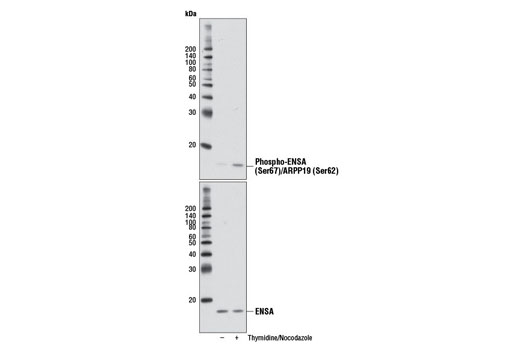WB
H R
Endogenous
15
Rabbit
#P56211, #O43768
10776, 2029
Product Information
Product Usage Information
| Application | Dilution |
|---|---|
| Western Blotting | 1:1000 |
Storage
Specificity / Sensitivity
Species Reactivity:
Human, Rat
Species predicted to react based on 100% sequence homology
The antigen sequence used to produce this antibody shares
100% sequence homology with the species listed here, but
reactivity has not been tested or confirmed to work by CST.
Use of this product with these species is not covered under
our
Product Performance Guarantee.
Mouse
Source / Purification
Polyclonal antibodies are produced by immunizing animals with a synthetic peptide corresponding to residues surrounding Ser67/Ser62 of human ENSA/ARPP19 protein. Antibodies are purified by protein A and peptide affinity chromatography.
Background
Mitotic control is important for normal growth, development, and maintenance of all eukaryotic cells. Research studies have demonstrated that inappropriate control of mitosis can lead to genomic instability and cancer (reviewed in 1,2). A regulator of mitosis, Greatwall kinase (Gwl), was first identified in Drosophila melanogaster (3). Subsequent studies showed that, based on sequence homology and function, microtubule-associated serine/threonine kinase-like (MASTL) is the human ortholog of Gwl (4). Regulation of MASTL/Gwl activation has been shown to be critical for the correct timing of mitosis. Research studies have shown that Gwl is activated by hyperphosphorylation (5). The phosphorylation of human Gwl at Thr194 and Thr207 by active cyclin B1-cdc2 leads to possible autophosphorylation at Ser875 (Ser883 in Xenopus), which stabilizes the kinase. Activated Gwl phosphorylates α-Endosulfine (ENSA) and cAMP-regulated phosphoprotein 19 (ARPP19) at Ser67 and Ser62, respectively. Phosphorylated ENSA and ARPP19 inhibit the activity of the B55 subunit-associated form of protein phosphatase 2A (PP2A-B55), allowing for complete phosphorylation of mitotic substrates by cyclin B1-cdc2 and mitotic entry. When Gwl is inactivated, PP2A-B55 reactivates, which leads to dephosphorylation of cyclin B1-cdc2 and mitotic exit (5,6, reviewed in 7).
- Eichhorn, P.J. et al. (2009) Biochim Biophys Acta 1795, 1-15.
- Norbury, C. and Nurse, P. (1992) Annu Rev Biochem 61, 441-70.
- Yu, J. et al. (2004) J Cell Biol 164, 487-92.
- Voets, E. and Wolthuis, R.M. (2010) Cell Cycle 9, 3591-601.
- Blake-Hodek, K.A. et al. (2012) Mol Cell Biol 32, 1337-53.
- Vigneron, S. et al. (2011) Mol Cell Biol 31, 2262-75.
- Lorca, T. and Castro, A. (2012) Oncogene 32, 537-543.
Species Reactivity
Species reactivity is determined by testing in at least one approved application (e.g., western blot).
Western Blot Buffer
IMPORTANT: For western blots, incubate membrane with diluted primary antibody in 5% w/v BSA, 1X TBS, 0.1% Tween® 20 at 4°C with gentle shaking, overnight.
Applications Key
WB: Western Blotting
Cross-Reactivity Key
H: human M: mouse R: rat Hm: hamster Mk: monkey Vir: virus Mi: mink C: chicken Dm: D. melanogaster X: Xenopus Z: zebrafish B: bovine Dg: dog Pg: pig Sc: S. cerevisiae Ce: C. elegans Hr: horse GP: Guinea Pig Rab: rabbit All: all species expected
Trademarks and Patents
Limited Uses
Except as otherwise expressly agreed in a writing signed by a legally authorized representative of CST, the following terms apply to Products provided by CST, its affiliates or its distributors. Any Customer's terms and conditions that are in addition to, or different from, those contained herein, unless separately accepted in writing by a legally authorized representative of CST, are rejected and are of no force or effect.
Products are labeled with For Research Use Only or a similar labeling statement and have not been approved, cleared, or licensed by the FDA or other regulatory foreign or domestic entity, for any purpose. Customer shall not use any Product for any diagnostic or therapeutic purpose, or otherwise in any manner that conflicts with its labeling statement. Products sold or licensed by CST are provided for Customer as the end-user and solely for research and development uses. Any use of Product for diagnostic, prophylactic or therapeutic purposes, or any purchase of Product for resale (alone or as a component) or other commercial purpose, requires a separate license from CST. Customer shall (a) not sell, license, loan, donate or otherwise transfer or make available any Product to any third party, whether alone or in combination with other materials, or use the Products to manufacture any commercial products, (b) not copy, modify, reverse engineer, decompile, disassemble or otherwise attempt to discover the underlying structure or technology of the Products, or use the Products for the purpose of developing any products or services that would compete with CST products or services, (c) not alter or remove from the Products any trademarks, trade names, logos, patent or copyright notices or markings, (d) use the Products solely in accordance with CST Product Terms of Sale and any applicable documentation, and (e) comply with any license, terms of service or similar agreement with respect to any third party products or services used by Customer in connection with the Products.
